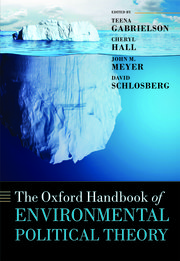Editors Teena Gabrielson et al bring together forty scholars in The Oxford Handbook of Environmental Political Theory to offer diverse perspectives on how contemporary environmental theory is shaped by systems of power, privilege and politics. Although the book is limited by its Euro-American focus, Rebecca Jarvis finds this an important and eclectic collection that suggests how better knowledge of Environmental Political Theory might help us to solve our most pressing environmental challenges.
The Oxford Handbook of Environmental Political Theory. Teena Gabrielson, Cheryl Hall, John M. Meyer and David Schlosberg (eds). Oxford University Press. 2016.
 The last few years have seen myriad calls to consider the broader social and political systems within which environmental issues are embedded. But what does this really mean? In their timely and thought-provoking book The Oxford Handbook of Environmental Political Theory, editors Teena Gabrielson, Cheryl Hall, John M. Meyer and David Schlosberg bring together forty Environmental Political Theory (EPT) scholars to offer diverse perspectives on how contemporary environmental challenges are shaped by systems of power, privilege and politics.
The last few years have seen myriad calls to consider the broader social and political systems within which environmental issues are embedded. But what does this really mean? In their timely and thought-provoking book The Oxford Handbook of Environmental Political Theory, editors Teena Gabrielson, Cheryl Hall, John M. Meyer and David Schlosberg bring together forty Environmental Political Theory (EPT) scholars to offer diverse perspectives on how contemporary environmental challenges are shaped by systems of power, privilege and politics.
The core of the book is divided into four sections. The first section establishes EPT as a field of enquiry, provides insights into how Western political thought has shaped EPT and demonstrates the contributions of EPT to environmental and sustainability studies. The second section challenges the reader to rethink nature and political theory, addressing questions on how we conceptualise environmental issues, and who – or what – is included in EPT. The third section discusses the values that motivate environmentalists and EPT scholars, including justice, human rights, freedom, flourishing and agency. The fourth and final section examines how a better understanding of power, structures and politics can help us identify the changes we need to implement in order to move forward towards more just and sustainable futures. As such, the book offers a good grounding in the foundational ideas and arguments of the field, while also highlighting directions for future scholarship. As a researcher interested in how we can drive change, I particularly enjoyed the second half of the book.
In Chapter 25, Jason Lambacher reflects on how the concept of freedom has been used to both constrain and facilitate environmental action. Lambacher highlights how ‘environmentalism has too often recklessly deployed a politics of doom and gloom rhetoric that emphasises logistics of catastrophe accompanied by fear, guilt, and punishment’ (396). This politics of fear relies on an appeal to self-interest and ethical duty that ‘wakes people up but often shuts people down’ (396). Environmentalism has been skilfully framed as anti-freedom by those who oppose it; yet, the aspiration for freedom, particularly freedom of choice, is a fundamental part of the human condition for many. We must therefore shift the paradigm away from expressing environmental risk as a threat to our freedom to start communicating how our choice to live in an environmentally just and sustainable world is an expression of our freedom. We must also investigate how our environmental freedoms may enhance and intersect with other freedoms we may also aspire to, such as civil rights, human rights, property, vocation, leisure or freedom of expression. Such a politics of hope is far more likely to embolden our actions and our agency, providing a novel grounding for environmental political legitimacy and social creativity.

In Chapter 32, Mark B. Brown provides an interesting perspective on the need to institutionalise and legitimise the politicisation of environmental science. Brown argues that science is politicised whether we like it or not, so we should improve our understanding of how science and politics shape each other. Scientific expertise is used to support political claims, but has also been used to avoid responsibility by misdirecting blame towards the experts. It has also been used by those involved in environmental disputes to strategically delay decisions by calling for more evidence. As a result, science often becomes the battleground for politics, and environmentalists are often drawn into debating the credibility of their science rather than identifying the changes required to solve complex environmental issues. Brown argues that we should no longer represent science as apolitical and value-free, and should instead work to comprehend how environmental knowledge is used and understood in different contexts. Instead of arguing whether science should be politicised, we should focus our efforts on clarifying existing policy options, identifying new alternatives and mediating diverse priorities and claims. By better understanding the social and political meanings of science that underlie much environmental politics and policy-making, we can work towards identifying clear and accessible options for effective action.
Cheryl Hall provides an important critique of framing, nudging and choice architecture in Chapter 39. Such processes are designed to nudge individuals towards choices that are in their best interest, or emphasise a particular way to understand a problem and act upon it. While critics suggest such approaches risk becoming manipulative, paternalistic and superficial, this does not mean we should reject them outright. Rather, we should acknowledge that ‘there is no such thing as unframed information’ (595) and work towards developing contexts that frame and nudge in deliberative, democratic, transparent and environmentally transformative ways. For example, nudging citizens to participate in political processes through which they could then decide how to nudge themselves as a community. I agree with Hall that a deeper examination of the values, structures and systems of these processes is warranted. However, understanding these processes could also provide an important tool to ‘draw our attention to the foundational contexts that shape our views, actions, and ways of life – and thereby to enable us to begin to change them’ (604).
The main limitation of the book is its Euro-American focus and subsequent lack of scholars offering alternative non-Western EPT perspectives. However, the editors do openly acknowledge this in the introduction, highlighting how the field needs to ‘establish relationships with a new generation of environmental scholars, and to break down existing boundaries to establish a broader and more inclusive EPT community’ (13). I would love to see a follow-up to this handbook that delivers a broader range of non-Western perspectives, explicitly including a range of scholars working at the social-political-environmental nexus in Asia, the Middle East and the Global South.
Despite this limitation, The Oxford Handbook of Environmental Political Theory provides an important and eclectic mix of essays that will challenge readers to consider the dominant narratives within their own field, and identify their own biases. I recommend this book to anyone with an interest in developing a more nuanced and multifaceted understanding of how complex environmental issues shape political thinking, how our political thinking shapes environmental discourse and how better knowledge of EPT can help us solve our most pressing environmental challenges.
Rebecca Jarvis is an interdisciplinary social scientist with research experience working in academia and conservation NGOs around the world. Rebecca’s research focuses on enhancing collaboration in complex conservation systems, and developing new approaches that better link research, policy and action. During her PhD, she developed a research agenda that better accounts for the social and institutional dimensions of effective and inclusive conservation. You can find her on twitter: @rebecca_jarvis or her website: www.rebeccajarvis.info.
Note: This review gives the views of the author, and not the position of the LSE Review of Books blog, or of the London School of Economics.







